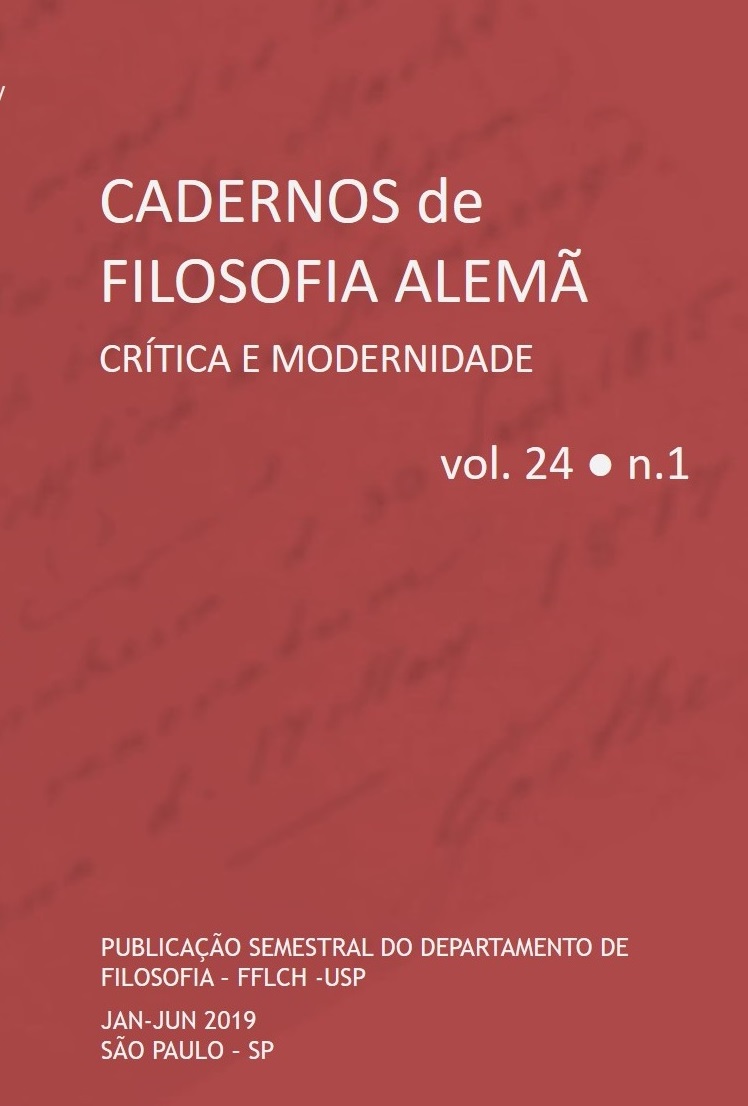Judgment and opinion in Hannah Arendt
DOI:
https://doi.org/10.11606/issn.2318-9800.v24i1p35-65Keywords:
Hannah Arendt, Political philosophy, Pluralism, Judgment, OpinionAbstract
The first part of this paper reconstructs the history of political philosophy as narrated by Hannah Arendt, starting with some of her main characters: Platão, Hegel, and Marx. Despite relating to different contexts, problems and events, these philosophers carry a common trait: the avoidance of politics and the hostility to human pluralism. I intend to demonstrate that, for Arendt, the possibility of a renewed political philosophy depends on this exercise of subjecting Western political philosophy to a radical criticism. The second part analyses the philosophical solutions presented by Arendt in an attempt of reconciliation between philosophy and politics regarding two central themes that are intertwined: the formation of judgment and opinion. The dialogic and intersubjective formation of opinion (which Arendt formulates with reference to Socrates) and the representative thinking (that she formulates referring to Kant) are, in my interpretation, two of the most potent moments of her work, capable of providing precious insights for the ongoing updating of her political thought.
Downloads
References
Arendt, H. (1958). The origins of totalitarianism. Cleveland: Meridian Books.
Arendt, H. (1992). Entre o passado e o futuro. São Paulo: Editora Perspectiva.
Arendt, H. (1993). “O grande jogo do mundo”. In: A dignidade da Política. Rio de Janeiro: Relume-Dumará.
Arendt, H. (1993a). “O interesse pela política no recente pensamento filosófico europeu”. In: A dignidade da Política. Rio de Janeiro: Relume-Dumará,
Arendt, H. (1993b). “Só permanece a língua materna”. In: A dignidade da Política. Rio de Janeiro: Relume-Dumará.
Arendt, H. (2002). A vida do Espírito. Rio de Janeiro: Relume Dumará.
Arendt, H. (2003). Homens em Tempos Sombrios. São Paulo: Companhia das Letras.
Arendt, H. (2004). As origens do totalitarismo. São Paulo: Companhia das Letras.
Arendt, H. (2008). “O Fim da tradição”. In: A promessa da política. Rio de Janeiro: Difel.
Arendt, H. (2010). Sobre Hannah Arendt. Tradução de Adriano Correia. Inquietude, Goiânia, 1(2), ago/dez. 2010.
Arendt, H. (2014). A condição humana. Tradução Roberto Raposo. Revisão e apresentação Adriano Correia. São Paulo: Forense Universitária.
Benhabib, S. (1990). Hannah Arendt and the redemptive power of narrative. Social Research, 57(1) (Spring 1990).
Benhabib, S. (2000). The reluctant modernism of Hannah Arendt. Oxford: Rowman & Littlefield Publishers.
Frateschi, Y (2016). Liberdade política e cultura democrática em Hannah Arendt. Cadernos De Filosofia Alemã, 21(3), pp. 29-50.
Habermas, J (1977). Hannah Arendt´s Communications Concept of Power. Social Research, 44(1) pp. 3-24.
Hill, M (1979). Hannah Arendt: the memory of the public world. New York: St. Martin’s Press.
Marx, K. & Engels, F. (2002) A ideologia alemã. São Paulo: Martins Fontes.
Nunes, I. (2018). In Between - o mundo comum entre Hannah Arendt e Karl Jaspers: da existência política ao exemplo moral. Tese de Doutorado. Instituto de Filosofia e Ciências Humanas, Universidade Estadual de Campinas, Campinas, SP.
Downloads
Published
Issue
Section
License
Information and conceptions on the texts are complete responsibility of the authors.
All the articles submitted before July 5th 2018 and those published after July 2021 are licensed under a CC BY-NC-ND license – except those published between the aforementioned dates, which are under the CC BY-NC-SA license. The permission for the translation of the material published under the license CC BY-NC-ND by third parts can be obtained with the consent of the author.
Open access policies - Diadorim
Rules applied before July 5th 2018:
Presenting a submission to our Editorial Board implies granting priority of publication for “Cadernos de filosofia alemã”, as well as transferring the copyright of texts (once published), which will be reproduced only with the manifest authorization of the editors. Authors keep the right to reuse the texts published in future editions of their work, without paying any fees to "Cadernos”. We will not grant the permission to re-edit or translate the texts for third parts without agreement of the author.


